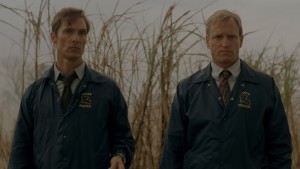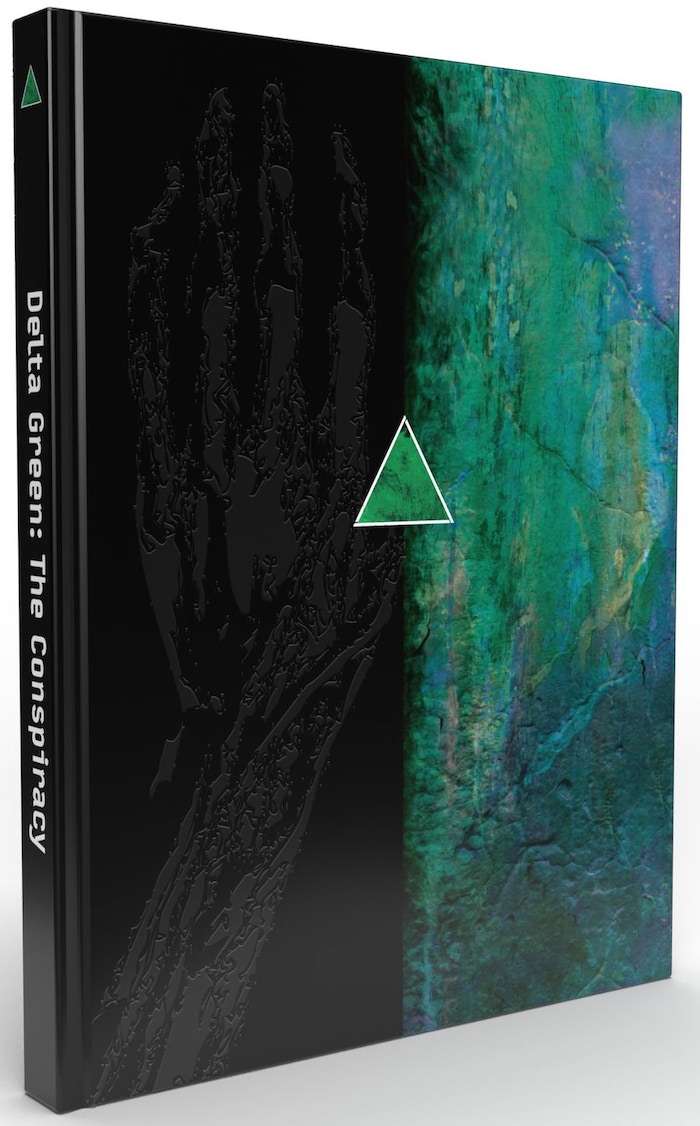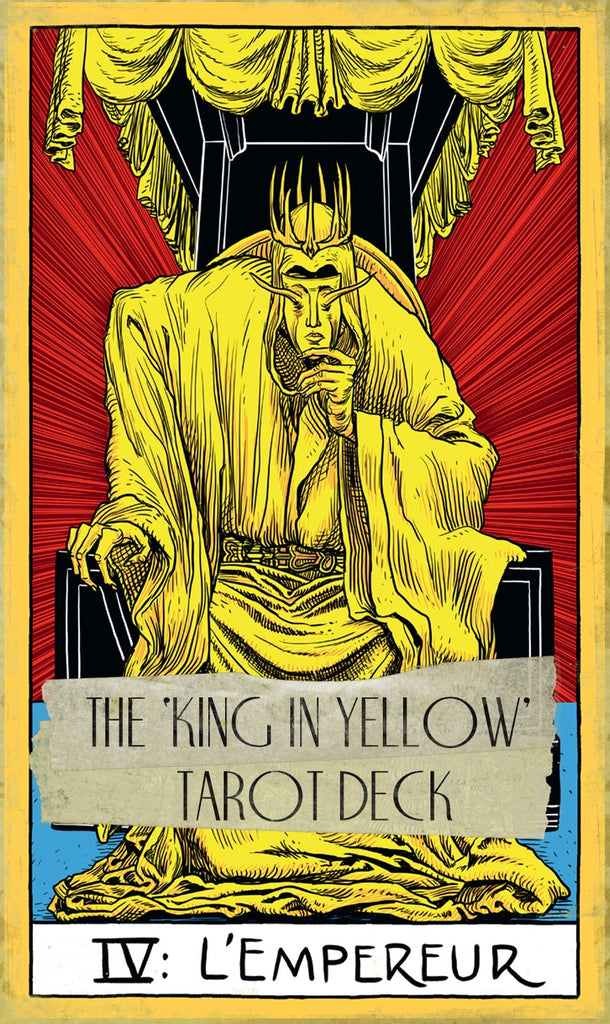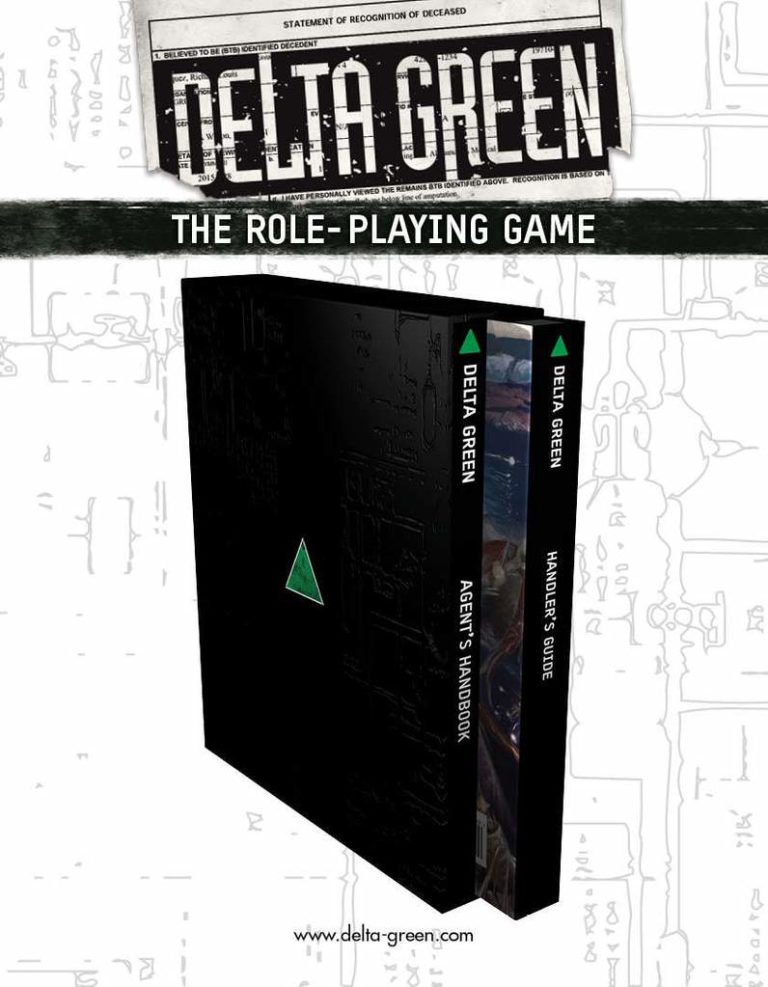by Adam Scott Glancy © 2014
A Return to Small “c” Conspiracy with TRUE DETECTIVE
Back in February 2005, I wrote my second Directive From A-Cell for Worlds of Cthulhu magazine. It was titled “Conspiracy with a Little c.” That Directive provided advice, particularly for non-U.S. players, on how to create Delta Green-style campaigns set in their home countries. You can read it at Delta-Green.com.
Part of that directive addressed developing foreign government agencies into campaign settings by building Mythos-aware conspiracies around local law enforcement agencies. Certainly the most likely point of contact between the civil authorities and the Mythos is local police. Servants of the Mythos, and the sort of creatures they consort with, have a tendency towards murder and mayhem. That draws the attention of law enforcement officers even if it does leave them baffled. Lovecraft himself mentions them often; think of the five unfortunate state police officers who disappear when they try tracking down the spawn of Yog-Sothoth in “The Dunwich Horror.”
In fact, destructive or lethal Mythos incidents are more likely to draw the attention of state and local law enforcement entities long before the federal agencies that Delta Green has infiltrated. From their lofty vantage as federal agents there’s a good chance that Agents of Delta Green won’t find out about the situation until after the locals have encountered it and either thoroughly muddied the waters or made the situation even worse. Even getting Delta Green an invitation to the party might be hard to come by if the local authorities don’t ask for federal assistance. If the Delta Green Agents want to use the authority of their day jobs during a Night at the Opera, the Keeper or the players must come up with a jurisdictional justification for federal involvement. That’s sometimes easier said than done. I certainly have no trouble hand-waving some of that detail with a successful Law roll.
While the local police have jurisdiction to investigate the sort of murder and mayhem that accompanies close contact with the Cthulhu Mythos, they certainly lack the knowledge and skill base to deal with it. In the game they’re usually NPCs, who rarely have the same capacity to grow and develop as much as player characters.
Of course, things would be different if the players were running local cops investigating a Mythos incident.
I’ve always wondered what such a campaign might look like, run from the point of view of hard-bitten police officers working to unravel a mystery that makes no rational sense. Fortunately, HBO came to my rescue in the winter of 2014 with the epic first season of True Detective.
True Detective is a brilliantly written crime drama whose atmosphere, character and plot mixes the bleakness of a gritty police procedural with nihilistic cosmic horror. For those who haven’t had a horde of friends and fans beat a path to their Facebook page to pour out bucket after bucket of spoilers, I’ll be as discreet as possible. But it is almost impossible not to spoil True Detective’s best moments when describing its usefulness for Keepers and players of Call of Cthulhu. Since the series is now available on DVD, I suggest you stop reading this directive, get a copy, and watch it. You can see all eight episodes in about nine hours. Then come back and continue reading.
Now that you’ve seen the whole season, we can proceed.
Rather than talk about the plot of True Detective, or rattle on and on about all the weird fiction and cosmic horror elements that make cameos throughout (especially that heaping dose of Thomas Ligotti that’s poured right on top), this Directive is going to concentrate on the series setting and its relevance to playing Delta Green, specifically its connection to “conspiracy with a little c” scenarios.
What I mean by “conspiracy with a little c” is a scenario involving a smaller investigative team which begins utterly ignorant of the existence of the Cthulhu Mythos. Through the course of their investigations they become more and more aware or the true nature of reality. With that awareness comes the responsibility to act against the threat posed against humanity, not just by the denizens of this carnivorous Lovecraftian universe, but also the threat posed by the awareness of humanity’s place in that universe. In such a campaign setting, the players do not start off as members of Delta Green conspiracy, but instead build their own conspiracy within whatever law enforcement organ they call home.
True Detective’s two protagonists, Det. Rustin Cohl (played by Matthew McConaughey) and Det. Martin Hart (Woody Harrelson), are homicide investigators with the Louisiana State Police. Their jurisdiction covers the entire state of Louisiana, with their powers of arrest, investigation and the use of armed force overlapping every with that of every parish sheriff and every municipal police chief. In practice, however, they operate in those backwater parishes where there aren’t large enough municipalities to support a specialized homicide investigation unit. That means they are out in the boondocks, in isolated rural locations that are hard to find if you are from somewhere else, and even harder to get out of if you are born there. These are the kinds of places that slowly kill their residents with a combination of crushing poverty, brutal ignorance, and learned helplessness. People tend to forget that the vast majority of North America is not urban or suburban, but rural and poor. The vacation homes of the one-percenters aside, wealth concentrates in the cities, not the countryside. Out there in the tall and uncut, beyond help or rescue, is where the horrors wait, human or otherwise.
As homicide investigators, it’s Cohl’s and Hart’s job to turn over rocks in those parts of the state everyone else would prefer to ignore. Both are patient, observant professionals, hardened by years of working cases. As they begin to unravel a murder case that appears to have been motivated by occult beliefs, they’re unwilling to allow the case to be derailed by conventional superstitions. They’re also unwilling to ignore uncomfortable connections between the killer and several old, powerful families who’ve acted as state power brokers for generations. Louisiana has an ugly history of these sorts of families, from the Long brothers in the state capital and the Perez family of Plaquemines Parish to the DeMonte Clan of New Orleans. It’s the historical facts that make the fiction easier to sell.
And because of that history and localized setting, True Detective seizes an opportunity for telling stories with a unique conspiratorial edge. Like Tip O’Neil was fond of saying, “All politics is local.” The same might be said of conspiracies. In True Detective’s first season there is a conspiracy at work, wound deep around those who work the levers of the state’s political machinery and those who style themselves as God’s representatives on earth. It’s not a conspiracy that will end the world, free the Old Ones or hasten the End Times. But there are dozens and dozens of poor, dead women that no one in charge really gives a shit about. The story is very much a confrontation between bad men and evil men.
Sound familiar?
State and local police investigators don’t get a lot of love in Delta Green. The local police are usually treated as either the blundering bumpkins who blindly step on the supernatural land mine or as the arrogant idiots who think they’ve solved the problem when they haven’t even scratched the surface. While the professionalism of law enforcement was certainly a complete crap-shoot during the so-called “classic era” of Call of Cthulhu (i.e. the period between the two World Wars), by the 21st century you’ve got to go a long way before you can find a police department doesn’t know how to process a crime scene, let alone one that is so incompetent that it actually thinks it can. Most agencies and officers at least know what they do not know and understand when it is time to call in the specialists. Sometimes that means the small-town department calls in the larger sheriff’s department. Sometimes that means the sheriff calling in the state police.
Most state police criminal investigation divisions are nothing to sneeze at. State police forces are often close to a century old and some, like the Texas Rangers, are even older. That gives them institutional memories even longer than most federal law enforcement organizations. State police laboratories have all the strengths and weakness one expects from crime labs across the country. Perhaps the only failing of these state investigators is that they generally have a smaller budget than their federal counterparts. Nevertheless these are formidable agencies with large pools of manpower, talent and experience. And they have one serious advantage over the feds: they are operating in familiar territory.
Starting a campaign with the players representing a state police agency, like the California Bureau of Investigation or the Florida Department of Law Enforcement, offers the players an opportunity to peel the Mythos onion from the very first layer. If they’re already seasoned investigators, the players’ encounter with a crime motivated or executed by occult means will be their first step down the rabbit hole. The expectation of the mundane horrors that humans inflict on each other will be stripped away with each revelation until the Investigators must start seriously questioning the consensual reality in which everyone puts so much faith. Now they’re through the looking glass. Up is down. Black is white. And monsters are real. The only questions that remain are how do they find the monsters, how do they kill them, and how do they get away with it?
Unlike a standard Delta Green campaign, the players have to contend with what I consider the biggest problem facing police investigators tackling a case with supernatural elements: credibility. As the investigation encounters more and more supernatural means, motives and suspects, the more the players must work harder to obscure these facts from their superiors. And the Keeper must decide the repercussions if they don’t. At least when Delta Green Agents are working a Night at the Opera, they don’t have to justify their actions to A-Cell every step of the way. Players working on an official case for a legitimate agency are going to get taken off that case if they admit to their superiors where the evidence is taking them. They don’t just have to worry that servants of the Mythos have penetrated the inner working of their agency. The real trouble begins when they bring their superiors an unprosecutable mess that is only explainable via supernatural or occult factors. The best case is it makes the Investigators look too insane to remain cops.
So, in order for the Investigators to be effective, a layer of deception must be created between the investigators and their superiors. Such a deception might jeopardize the case and the Investigators’ careers, but the only alternative is to tell the truth, and that is a guaranteed disaster. By telling unbelievable truths Investigators’ credibility will be damaged and they will lose the confidence of their superiors. If their superiors cannot rely on the Investigators for a clear-eyed and rational approach to the evidence, the case will be assigned to another “less imaginative” team of Investigators. Those will either pursue a mundane explanation or let the case linger and die with no resolution. Meanwhile, the Investigators will find themselves exiled to some kind of law-enforcement Siberia, like the evidence room or prisoner transfer, and piles on punishments for trivial rule breaking until they get fed up and quit.
The Investigators have to make progress towards a resolution of their case, but they also have to disguise their progress so that it appears they are moving towards a believable motive executed by rational means. This brings us back to the shop-worn technique of bad-jacketing the cultists: framing the servants of the Mythos for prosecutable crimes in order to pursue the investigation and justify an arrest. Or at least to justify an arrest warrant that can get the Investigators close enough for a confrontation. Considering the nature of the crimes and criminals who fall into the Mythos’ orbit, the Investigators will probably want a case resolution that involves the suspects being killed “while resisting arrest.”
A campaign set among state police investigators could be a very interesting way to introduce the players to Delta Green. Non-player Delta Green Agents might appear on the scene only to push the players’ paranoia into overdrive. Getting Delta Green involved as events progress is fairly easy if the players have been collecting inexplicable evidence. The state crime lab could have sent this impenetrable evidence off to the FBI’s lab at Quantico, where Friendlies alerted A-Cell to the presence of paranormal or preternatural involvement. The Investigators’ superiors may have called in the FBI’s Behavioral Research and Instruction Unit to work up a psychological profile on the UNSUB. Something in the criminal M.O. could tip off Delta Green that something inhuman is at work. Of course, since it’s player characters who are running the investigation, they’re not going to be quite as willing to accept outside help as well-scripted and (frankly) all-too trusting NPCs would if the roles were reversed.
For the local Investigators, these out-of-town feds represent a completely unknown agenda. Are they here to hijack the investigation and freeze out the local Investigators? Are the feds involved with the supernatural? How much do they know? Are they protecting something? Or are these straight-laced boy-scouts going to get in the Investigators’ way by playing everything by the book? Could these feds end up putting the Investigators in jail for violating the rights of a suspect? It’s hard to imagine the tightly knit team of Investigators taking these feds into their confidence. The risks most likely outweigh any obvious benefits.
A Delta Green team might not make themselves known to the Investigators at all during their investigation. Their role might be nothing more than to keep the Investigators under discreet surveillance and sanitize any crime scene where they were a tad sloppy cleaning up, possibly policing up any suspects that slip through the Investigators’ fingers. There is always the possibility that if the players distinguish themselves in the fine art of vigilante justice, Delta Green might approach them for recruitment. And of course, all that lying to their bosses, all that manufactured evidence, all that illegal surveillance and unconstitutional searches—all of that is just finishing school for a Delta Green Agent.
As Rustin Cohl says: “The world needs bad men. We keep the other bad men from the door.”
– Adam Scott Glancy






